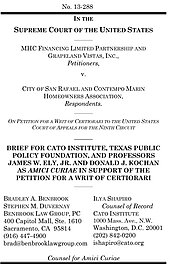Learn more about Cato’s Amicus Briefs Program.
Contempo Marin isn’t your stereotypical mobile-home park. The park sits two miles from San Francisco Bay and offers tenants a pool, spa, clubhouse, and lagoon. Due to the location and amenities, these mobile homes — some of which offer vaulted ceilings, gas fireplaces, walk-in closets, and jetted tubs — can sell for over $300,000. That’s what makes the rent- and vacancy-control ordinance imposed by the City of San Rafael in the name of “affordable housing” so outrageous. The ordinance caps the amount that MHC Financing, the owner of Contempo Marin, may charge its tenants — who own their mobile homes but rent the land underneath — and mandates that the land be rented at the same price to each homeowner. The result isn’t lower costs for incoming tenants, but a redistribution of the value from the below-market rent directly to the mobile-home owners, whose homes now sell at a premium of nearly $100,000 above their pre-existing value. Thus far, the ordinance has transferred more than $95 million from MHC to its tenants. MHC challenged the ordinance in federal court as an unconstitutional taking. The district court ruled in MHC’s favor, finding that the alleged public purpose of the ordinance — “affordable housing” — was merely a pretext, such that the ordinance violated the Fifth Amendment’s mandate that property only be taken for a “public use.” As Justice Kennedy clarified in Kelo v. City of New London (2005), “transfers intended to confer benefits on particular, favored private entities and with only incidental or pretextual public benefits, are forbidden by the Public Use Clause.” The U.S. Court of Appeals for the Ninth Circuit, however, reversed the district court, holding that rent control generally, rather than the specific rent-control scheme at issue here, is “rationally related to a conceivable public purpose” and thus automatically meets the public-use requirement. MHC is now asking the Supreme Court to review that ruling and Cato has filed a supporting amicus brief, encouraging the Court to clarify the standard of review applied to pretextual takings claims and to confirm that the Takings Clause isn’t rendered inoperative when property is transferred. The Ninth Circuit’s approach essentially bars future pretextual takings claims; any regulatory scheme viewed at its broadest theoretical level could have some “conceivable public purpose.” This evisceration of the Public Use Clause leaves the appropriate standard for determining if a government’s public-use justification is mere pretext in desperate need of Supreme Court clarification. The Ninth Circuit also undermined the Fifth Amendment by finding that no taking had even occurred because MHC had bought Contempo Marin after the rent- and vacancy-control provision had been enacted and therefore could have no investment-backed expectation as to the property value taken by the city. This decision directly conflicts with Palazzolo v. Rhode Island (2001), in which the Supreme Court held that buying property with knowledge of a regulation doesn’t preclude a takings challenge. The Ninth Circuit ignored the same precedent in Guggenheim v. City of Goleta in 2011 — a case in which Cato also filed an amicus brief supporting a petition for review — and the lower court’s continued misapplication of the law here reiterates the need for the Supreme Court to reaffirm that the Takings Clause has no “expiration date.”

This work is licensed under a Creative Commons Attribution-NonCommercial-ShareAlike 4.0 International License.
